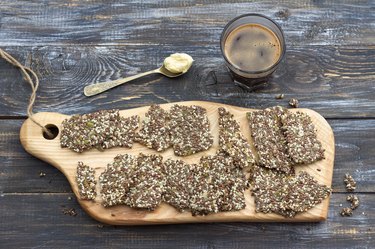
One of the side effects of hypothyroidism, or underactive thyroid, can be weight gain. Although there isn't a one-size-fits-all hypothyroidism diet, there are diet and exercise tips that can help get your metabolism humming again, so you can maintain a healthy weight.
Tip
If you have an underactive thyroid, a hypothyroidism diet that’s focused on whole foods can help you lose weight — especially when it’s combined with exercise.
Video of the Day
What Is Hypothyroidism?
Hypothyroidism is a condition in which your thyroid gland doesn't produce enough thyroid hormones. That's a problem because thyroid hormones plan a role in controlling most of the metabolic processes in your body. According to the American Thyroid Association, approximately 15 percent of Americans have hypothyroidism.
Video of the Day
Symptoms of hypothyroidism include feeling tired or cold, having constipation or dry skin, or feeling forgetful or more depressed. Because your thyroid regulates your metabolism, weight gain is also a common symptom. If you have hypothyroidism, it's important to take your synthetic thyroid hormone medication, if one was prescribed, and follow a healthy diet to maintain a healthy weight.
Thyroid Diet for Weight Loss
If you've gained weight due to hypothyroidism, any medication you've been prescribed will help your thyroid to work better, and hopefully make it easier to lose weight. In addition to medication, following a healthy thyroid diet for weight loss along with exercise, may speed things along.
There really isn't one specific hypothyroidism diet that works for everyone, but in general, it's helpful to reduce your calories by about 500 calories per day and bump up your exercise to lose weight. You will probably find it easier to lose weight if you cut out processed foods and stick to a whole foods diet because whole foods like fruits, vegetables and lean proteins tend to be lower in calories than most processed foods.
If your underactive thyroid is due to Hashimoto's, an autoimmune type of hypothyroid disease, your hypothyroidism diet should be gluten-free and dairy-free. Gluten is a protein found in wheat, rye and barley, so these or any wheat-based grains should be eliminated.
Some research, including a July 2018 study published in the journal Experimental and Clinical Endocrinology & Diabetes found that women with autoimmune hypothyroid disease who followed a gluten-free diet for six months had improved thyroid function compared to those who ate their regular diet.
Similar results have been seen for dairy-free, or no-lactose-containing foods, as noted in a June 2014 article published in the journal Endocrine.
What About Exercise?
If you're following a thyroid diet for weight loss, adding exercise will help you lose weight faster. However, you don't need to exercise excessively. The recommendation is the same as for all adults. The U.S. Department of Health and Human Services recommends at least 150 minutes to 300 minutes of moderate-intensity aerobic exercise each week, along with strength training twice per week.
Read more: The Best Exercises for Every Major Muscle
Best Foods for Thyroid Patients
The best foods for thyroid patients are really the same foods recommended for all healthy individuals. It's important to eat lots of fruits, vegetables, legumes, gluten-free grains like gluten-free oats, brown rice, quinoa, sorghum, lean proteins like chicken, fish, eggs or lean beef and nuts, seeds or avocado for healthy fats.
Studies like one published in July 2018 in the British Journal of Nutrition have linked processed foods like snack foods, frozen dinners and fast foods to weight gain and obesity, so they are not recommended for anyone, especially if you're on a hypothyroidism diet.
Other than these general healthy eating recommendations, there isn't a specific list of best foods for thyroid patients. Some people worry about cutting out cruciferous vegetables like broccoli, cauliflower or cabbage, but according to the British Thyroid Association, as long as you're eating them in normal and not excessive amounts, you should be fine.
Food, Nutrient and Medication Interactions
If you're taking medication for an underactive thyroid, it's important to take it on an empty stomach (not even with coffee) and make sure you don't take it with a calcium or iron supplement, as those can interfere with the absorption of your medication.
In addition, the British Thyroid Association recommends not eating or drinking soy foods, like soy milk, with your thyroid medication, and limiting kelp because it's very high in iodine and can interfere with your medication.
- American Thyroid Association: "Hypothyroidism (Underactive)"
- Experimental and Clinical Endocrinology & Diabetes: “The Effect of Gluten-Free Diet on Thyroid Autoimmunity in Drug-Naïve Women With Hashimoto's Thyroiditis: A Pilot Study”
- Endocrine: “Decrease in TSH Levels After Lactose Restriction in Hashimoto's Thyroiditis Patients With Lactose Intolerance”
- British Journal of Nutrition: “Ultra-Processed Food Consumption and Excess Weight Among US Adults”
- British Thyroid Association: “Thyroid and Diet Fact Sheet”
- U.S. Department of Health and Human Services Office of Disease Prevention and Health Promotion: “Top 10 Things to Know About the Second Edition of the Physical Activity Guidelines for Americans”
- National Institutes of Health: Medline Plus: "10 Ways to Cut 500 Calories a Day"